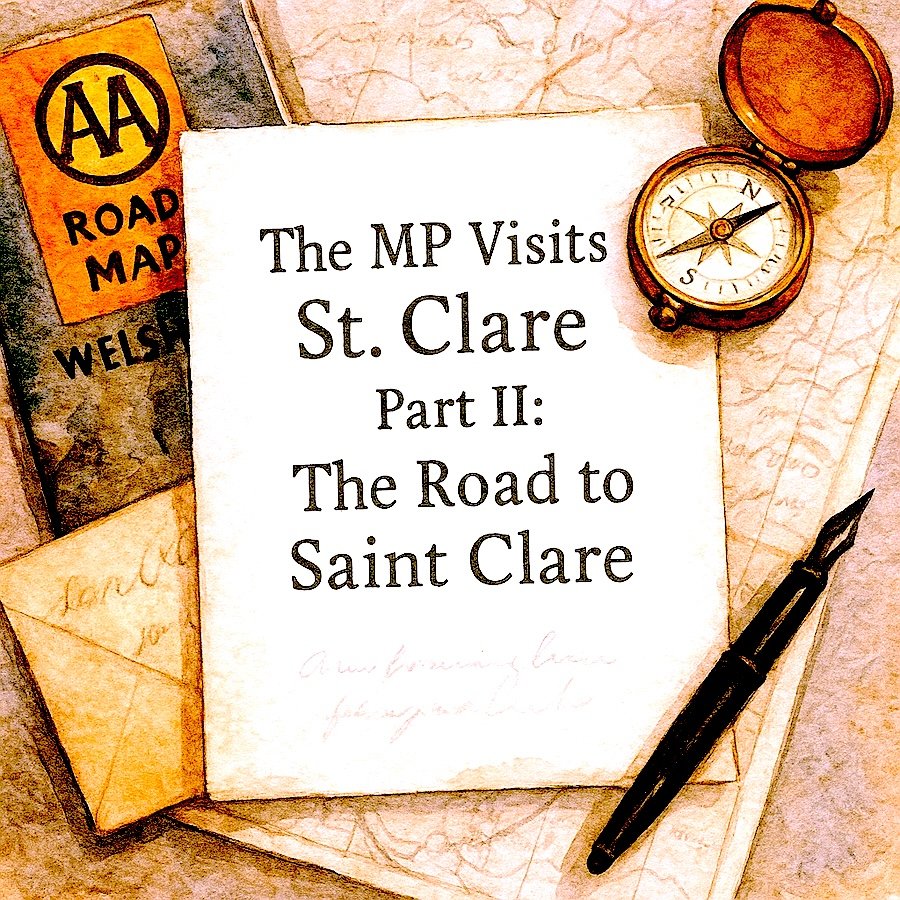3 comment(s) so far. Please add yours!
 This sequence draws from the Charrington Papers and the less officious corners of Saint Clare’s—those neat staff reports never meant to withstand scrutiny; the household logs written with a pointed, domestic hauteur; and the diaries, margins, and illicit notes in which the girls record rather more than their elders imagine. Some documents are respectably typed. Others arrive in the swift, unsteady cursive of someone writing under pressure, or in a place she very much oughtn’t be.
This sequence draws from the Charrington Papers and the less officious corners of Saint Clare’s—those neat staff reports never meant to withstand scrutiny; the household logs written with a pointed, domestic hauteur; and the diaries, margins, and illicit notes in which the girls record rather more than their elders imagine. Some documents are respectably typed. Others arrive in the swift, unsteady cursive of someone writing under pressure, or in a place she very much oughtn’t be.
Readers are invited to take up the archivist’s task, and the investigator’s pleasure, of weighing the School’s polished accounts against the smudged, contradictory recollections of those who actually lived the day. Much will be implied. Little will be stated outright. And attentive readers may notice that Miss Gladys Williams’s file, though she left Saint Clare more than five years ago, has begun to grow again—curiously, and on no official authority whatsoever.
The archive remembers. And so, of course, does Inez.
Comments are warmly welcomed. While I enjoy seeing them on Bluesky and Twitter, those left here become part of the archive proper, where they may—quietly—shape what follows.
The MP Visits Saint Clare continues. The earlier parts are:
Context is in Foreword below.
The story of Inez de Vries unfolds through a constellation of documents—some official, drawn from the prim and unforgiving files of Saint Clare’s School for Girls; others more intimate, taken from the journals, letters, and scribbled notes of the girls themselves. Some will appear typed and orderly; others retain the texture of handwriting, rendered in a cursive-style font.
Readers are invited to step into the role of archivist, assembling the story from these traces, and imagining the lives that fill the gaps between pages—the tensions, the alliances, the secrets too dangerous to write down. Not everything will be explained. But Inez is watching. And she remembers.
Note: Comments are read and much appreciated. Much as I like reading them on Twitter and Bluesky, I love getting them here, and promise to respond. Moreover your ideas and reactions also join the archives, where they may quietly shape what comes next.
Foreword (From the Archivist)
Those who have read the entry for 11 July 1955 will recall that the day ended in no small amount of sulking, slammed doors, and the sort of tense household quiet that staff notice before anyone else. Indeed, Mrs Dorcas Fielding—Housekeeper of Birchwood Grange and long-suffering witness to Miss Gladys Williams’s moods—noted in her report that she was “glad to see the back of them both” when the party departed the next morning.
 With that cheerful blessing, we arrive at 12 July, a date that would prove no gentler for anyone involved.
With that cheerful blessing, we arrive at 12 July, a date that would prove no gentler for anyone involved.
This first instalment follows Gladys’s own account of the journey from London to Saint Clare: the damp gloves, the Lyons tea, the spitefully packed hamper, and the slow, piercing recognition that she is returning not merely to a school but to the last place her life made any sense.
It is worth remembering, as the Rover crawls toward Oxford and tempers fray, that the true calamity of the day has not yet occurred. Gladys feels it coming—in the rustle of Gerald’s papers, in the heaviness of her own hunger, and in the sinking of her heart as the familiar silhouette of the school rises before her.
For now, though, it is enough to follow her into the motor just after nine o’clock, with Mrs Fielding watching from the doorway and thanking Providence that whatever awaits them in Wales will, at least, be elsewhere.
Gladys’s Diary
12 July, on the road to Saint Clare
We left London at nine sharp, Gerald, punctual as a firing squad, calling to me when I was still buttoning my gloves, so no breakfast nor even tea for me. St Alban’s was wrapped in mist, drizzle spotting the windscreen, my gloves clammy already. Gerald plonked himself down with his papers the instant we were in the Rover, and poor Fowler set off steady as a metronome. Judgment and disapproval rolling off Gerald like steam off a pudding. Every rustle of his notes made me feel like I’d committed a fresh crime.
By Oxford my stomach was ready to stage a mutiny. We stopped at Lyons Corner House, thank heaven, though it was hardly salvation: tea weak as dishwater, buns hard enough to kill a pigeon, but at least something hot. Gerald read The Times while pointedly checking his watch every five minutes. Typical. I chewed gloomily and imagined eggs and bacon at the Dorchester.
I would have smoked to take the edge off, but that, too, is forbidden me. Gerald says I ought to “begin as I mean to go on”, since the Institute won’t allow cigarettes and I had better be quit of them now, mentioning that, given my changed allowance, I should refrain from setting money on fire. As if I were some horrid addict to be weaned, instead of a perfectly normal woman who likes a fag with her tea. What utter rot.

